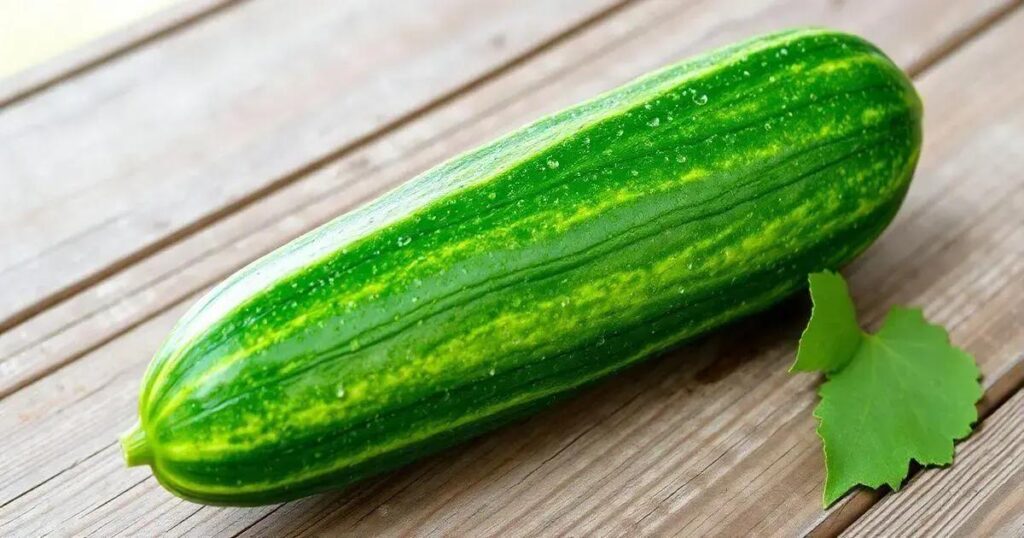African Cucumber, also known as Kiwano, is a natural fruit native to Africa that offers numerous health benefits, including hydration and being rich in vitamins. It can be enjoyed in salads, smoothies, or desserts, showcasing its unique flavor reminiscent of cucumber and kiwi.
Is African Cucumber natural or synthetic? This intriguing question draws many curious minds to explore the origins and benefits of this unique fruit. Known for its striking appearance and potential health benefits, African Cucumber (also called Kiwano) holds a special place in culinary and wellness circles. In this post, we will uncover its origins, reveal whether it’s natural or synthetic, and discuss how you can incorporate it into your diet.
Understanding African Cucumber

The African Cucumber, also known as Kiwano, is a unique fruit that hails from Africa. With its spiky yellow-orange exterior and vibrant green, jelly-like flesh, it attracts attention wherever it is found. Originally grown in the southern regions of Africa, this fruit has started to gain popularity in various parts of the world.
What Does It Taste Like?
The taste of African Cucumber is often described as a mix between banana, cucumber, and kiwi. Its mildly sweet flavor makes it an excellent addition to salads, smoothies, and desserts. The soft texture of the flesh reminds people of the interior of a tropical fruit, providing a refreshing experience.
Nutritional Profile
African Cucumber is not only tasty but also packed with nutrients. It is low in calories and contains vitamins A and C, which are essential for maintaining healthy skin and boosting immunity. Additionally, it has a good amount of fiber, which is beneficial for digestion and can aid in weight management.
Culinary Uses
This versatile fruit can be enjoyed in many ways. People commonly slice it up and add it to salads for a unique twist. It can also be blended into smoothies for a refreshing drink or used in desserts for an exotic flavor. The seeds are also edible and can add a delightful crunch to any dish.
Origins: Natural or Synthetic?

The origin of African Cucumber is quite fascinating. This fruit is native to southern Africa, where it has been cultivated for centuries. It is known locally as Kiwano, and it thrives in the regions with a warm climate.
Is It Natural?
African Cucumber is absolutely a natural fruit. It grows on a vine and is not genetically modified. Its unique appearance and taste are a result of natural evolution rather than human interference. This makes it a delightful fruit for those seeking natural foods in their diet.
History and Cultivation
Historically, African Cucumber was an important food source in ancient African cultures. It was used both for its nutritional value and for hydration, as it contains a significant amount of water. Today, it is cultivated in varying climates across the globe, including regions in New Zealand and California.
Modern Farming Practices
While the fruit itself is natural, some modern farming practices may involve the use of fertilizers and pest control methods. These practices can help improve yield and protect the crops from disease. However, many farmers focus on organic methods to ensure their produce remains natural.
Health Benefits of African Cucumber

The health benefits of African Cucumber are numerous, making it a valuable addition to any diet. This fruit is not only delicious but also packed with essential nutrients.
Rich in Vitamins
African Cucumber is an excellent source of vitamins A and C. Vitamin A is crucial for maintaining healthy vision and skin, while vitamin C boosts your immune system and helps the body heal.
High in Antioxidants
This unique fruit is loaded with antioxidants. Antioxidants help combat oxidative stress and may reduce the risk of chronic diseases. They support overall health and promote a strong immune response.
Hydration and Low in Calories
African Cucumber has a high water content, making it great for hydration. It’s low in calories, which can aid in weight management. Including it in your meals can help you feel full without consuming too many calories.
Digestive Health
Due to its fiber content, African Cucumber can promote digestive health. Fiber is essential for a healthy digestive system, helping to prevent constipation and aiding in regular bowel movements.
How to Use African Cucumber in Your Diet

Incorporating African Cucumber into your diet is easy and enjoyable. Here are several ways to make the most of this unique fruit.
Fresh Salads
One popular way to use African Cucumber is by adding it to salads. Simply slice the cucumber and toss it with your favorite greens. Its refreshing taste and crunchy texture will add a delightful twist to any salad.
Smoothies and Juices
You can also blend African Cucumber into smoothies. Combine it with fruits such as bananas and strawberries for a nutritious drink. Its high water content helps create a smooth and refreshing texture. Alternatively, you can juice it for a hydrating beverage.
Snacks and Dips
For a quick and healthy snack, cut African Cucumber into sticks and pair it with hummus or yogurt dip. This makes a perfect afternoon snack that is filling and nutritious.
In Desserts
Don’t shy away from using African Cucumber in desserts! You can dice it and mix it with honey, lemon, or mint for a delightful fruit salad. It pairs well with other tropical fruits, making it a great addition to your dessert recipes.
Uncovering the Truth About African Cucumber
In conclusion, African Cucumber, or Kiwano, is a fascinating fruit that offers a wealth of benefits. It’s entirely natural and boasts a rich history rooted in African culture.
With numerous health benefits, including hydration, rich vitamins, and antioxidants, it’s a fantastic addition to your diet. You can easily incorporate it into meals through salads, smoothies, snacks, and even desserts.
Embracing the use of African Cucumber not only enhances your culinary experience but also supports your overall health. So, don’t hesitate to explore this vibrant fruit and reap its many rewards.
FAQ – Frequently Asked Questions about African Cucumber
What is African Cucumber?
African Cucumber, also known as Kiwano, is a unique fruit native to southern Africa with a spiky yellow-orange exterior and vibrant green flesh.
Is African Cucumber natural or synthetic?
African Cucumber is completely natural. It grows on a vine and is not genetically modified.
What are the health benefits of African Cucumber?
African Cucumber is rich in vitamins A and C, antioxidants, and fiber, promoting hydration and digestive health.
How can I include African Cucumber in my diet?
You can enjoy African Cucumber in salads, smoothies, as snacks with dips, or even in desserts for a refreshing twist.
Where can I buy African Cucumber?
African Cucumber can be found in specialty grocery stores, farmers’ markets, and online produce retailers.
What does African Cucumber taste like?
African Cucumber has a mildly sweet taste that combines flavors of cucumber, kiwi, and banana, making it a refreshing treat.













